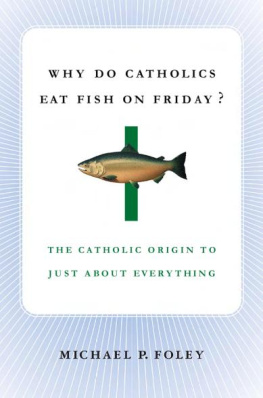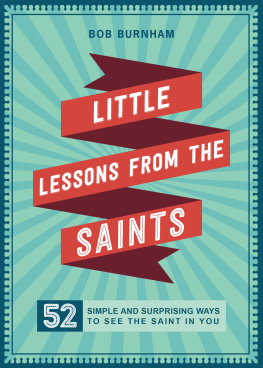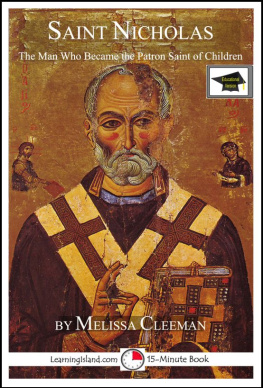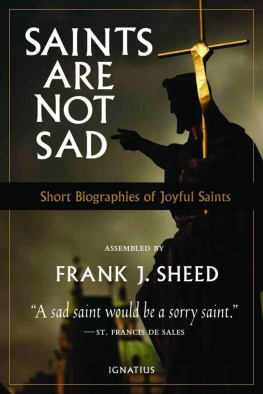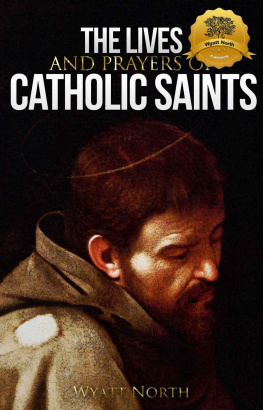C ONTENTS
To my kith and kin, living and departedthe Foleys, Rouleaus, Joe and Bobbie Forgey, and many morewho taught me the art of merriment. And to the Ryan clan, who has kept me in good practice.

P REFACE
H OW TO D RINK LIKE A S AINT
W hile researching our first book Drinking with the Saints , my wife, friends, and I were looking for what drinks we could recommend on the feast days of the liturgical year. What we did not expect to discover was a lesson in how to drink them. That lesson can be distilled into five key points, which we now happily share with you as the preface to our new book Drinking with Saint Nick . We are especially pleased to present our findings here as an antidote of sorts to the abuse of alcohol that unfortunately takes place during the secularized holiday season.
And so, to drink like a saintthat is, to enjoy alcohol the way it was meant by God to be enjoyedone must drink...
1. W ITH M ODERATION
Moderation is not only the morally responsible thing to do, it is also the more pleasant. The Epicureans of old were moderate in their appetites because of their commitment not to virtue but to maximizing their physical pleasure, for they knew that excess would rob them of the carnal goal they sought. Christians are free to profit from this insight, for God wants us to derive pleasure from His creation.
Moderation is also important because it fosters health, which is one of the reasons the Church has historically tolerated and even supported the consumption of alcohol (think of medieval religious orders and their production of beer, wine, whiskey, and liqueur). In the Middle Ages and beyond, alcohol purified contaminated water or served as a substitute for it, and it also acted as a medicine for different ailments. To this day, when Carthusian monks in the Grand Charterhouse (located high in the drafty French Alps) catch a cold, they take a tablespoon of their delicious herbal liqueur, chartreuse.
Lastly, moderation is key to fostering fellowship. Drinking just enough to relax the tongue but not enough to have it reel away from dispassionate thought is highly conducive to good conversation and camaraderie. As the poet Ogden Nash puts it in his poem Reflections on an Ice Breaker, Candy is dandy but liquor is quicker.
2. W ITH G RATITUDE
Moderation is also an expression of gratitude to God for the goodness of the grape and the grain. As Chesterton puts it: We should thank God for beer and burgundy by not drinking too much of them. Gratitude is a much-ignored virtue these days, as we fixate more and more on our rights and entitlements and less on what we owe to others. Indeed, for some modern philosophers such as Kant, gratitude is a bad thing, a threat to our autonomy, for it implies that we are in someone elses debt.
But for the Christian, it is a joy to give thanks to the God who creates, redeems, and sanctifies us and to see His goodness in all the goods around us, including those in our glass. Such gratitude should be especially prominent during the Christmas season, which recalls the astonishing fact that God freely chose to humiliate Himself by taking on lowly human flesh and being born in a stinky stable, all out of His delirious love for us. All genuine Christian culture, including the cultivation and consumption of strong drink, is a grateful response to Gods love. Note the gratitude fermenting in this statement by St. Arnold of Metz, a patron saint of brewers: From mans sweat and Gods love, beer came into the world.
3. W ITH M EMORY
Catholic piety is centered on the Eucharist, which means thanksgiving, and hence an attitude of gratitude permeates all aspects of Catholic life. But the Eucharist is also a memorial, a fulfillment of the command to Do this in memory of Me. Gratitude requires memory, specifically, the memory of the good things undeservedly given to us.
One of the key differences between healthy and unhealthy drinking is whether the imbiber is drinking to remember or drinking to forget. Consider the difference between the drinking that goes on at a truly good and noble wedding and the drinking that often goes on at a bar. At a good wedding, multiple generations gather to celebrate the triumphant and honorable nuptials of a faithful man and a faithful woman; they gather to celebrate the love of this new couple which, God willing, will only grow over the years and lead to more children and more love. And when they do so, they also remember the love in their own marriages, the love in their parents marriages, and on and on. They remember a great chain of love, and they raise their glasses to it. And something similar obtains at a great Christmas festivity, when loved ones from several generations gather to celebrate and remember the love of the Christ Child.
Contrast this picture with that of a solitary man at the end of the bar drinking alone. He laments his loneliness, his dead-end job, his lost youth. The man orders round after round not to remember the good but to forget the bad. Such a use of the drink falls far from the fine art of Christian quaffing.
4. W ITH M ERRIMENT
Another way to consider the difference between healthy and unhealthy drinking is to reflect on the notions of fun and merriment. Fun implies a form of entertainment that is not necessarily bad but is usually superficial and can be enjoyed alone. Perhaps a young man would have more fun playing video games with his friends, but it is conceivable that he can still have some fun playing the game by himself.
Merriment, on the other hand, necessitates fellowship. People usually do not make merry alone in a room; they make merry at a festival or a great banquethence the phrase, the more the merrier. At least to our mind, merriment presupposes strong community and a truly divine and memorable reason to celebrate: think of how absurd it would be to say Merry Administrative Professionals Day. But Merry Christmas still has real theological meaning, and not just because Christs Mass is mentioned. When we wish someone to be merry on Our Lords birthday, arent we hoping that he or she will have more than just a good time? Arent we invoking a kind of blessing upon them? There is almost something sacred about real merriment.
Of course, all of this involves risk: there is an obsolete term in English, merry-drunk, that suggests as much. But as Josef Pieper points out in his work In Tune with the World: A Theory of Festivity , all festivity contains a natural peril and a germ of degeneration because all festivity carries with it an element of lavishness. But just as lavishness need not involve decadence, wet merriment need not involve drowning.
5. W ITH R ITUAL
Piepers book calls to mind another aspect of merriment: ritual. The ritual festival, Pieper goes so far as to assert, is the most festive form of festivity. How? Because true festive joy cannot exist without God and without a tradition of celebration involving ritual praise and sacrifice. Without religious ritual, Pieper concludes, a holiday becomes not a profane festival but something worse: a contrived and artificial occasion that becomes a new and more strenuous kind of work.
We pious drinkers can appropriate Piepers wisdom with two simple practices. First, our celebrations should be grounded in the liturgical year, that grand recurring narrative of the mysteries of Christ and His saints. Catholic liturgy, Pieper writes, is in fact an unbounded Yea- and Amen-saying to the whole of reality and existence, and each saints feast day is both a celebration of a saints having said Yes to God and an invitation for us to do so as well. And, of course, this celebration takes on added meaning during the Advent and Christmas seasons, when we ritually anticipate and rejoice in the Word made flesh at the same time that we honor those saints whose feast days flank, as it were, the Lords manger.


